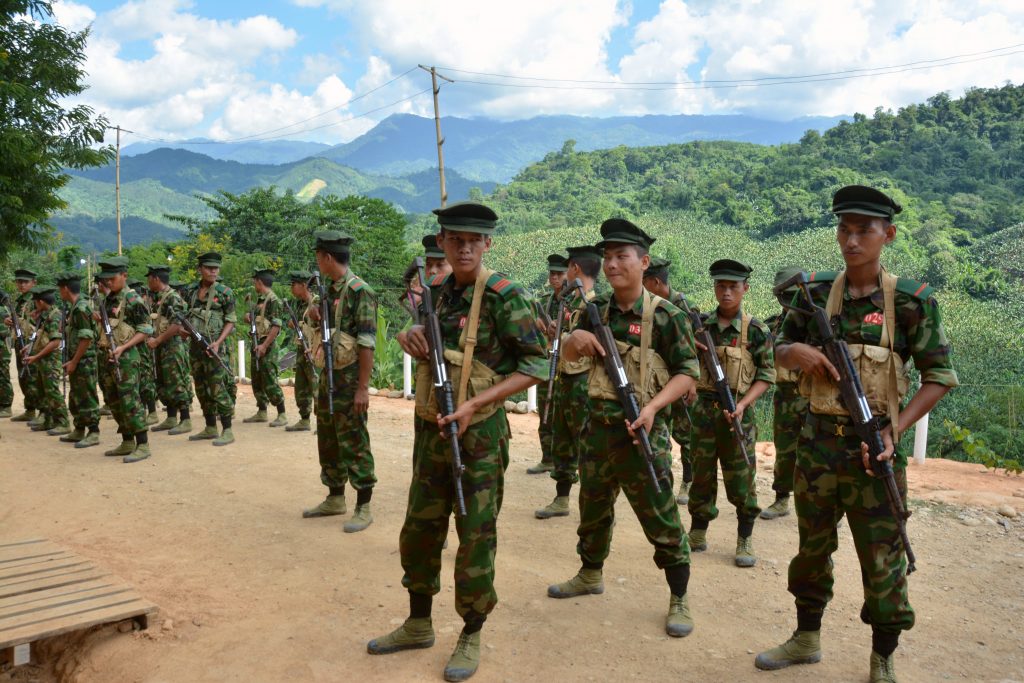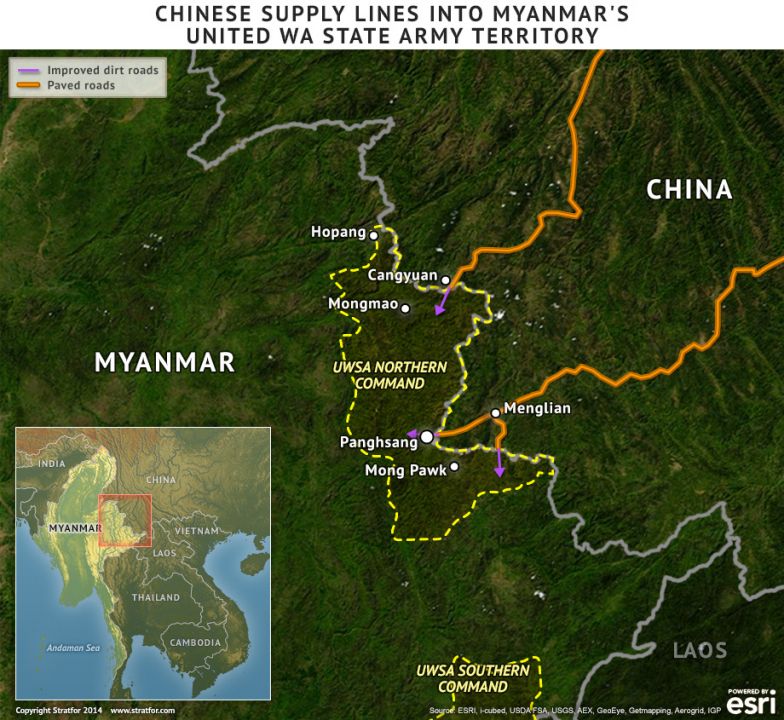
- Insurgent groups like MNDAA are part of a wider rebel alliance in northern Myanmar which also includes ethnic Palaung, Kachin and Arakanese forces and is supported by the powerful China-backed United Wa State Army.
- Top Kokang leadership went to China, where they received training and promises of support to run the nationalist Chinese Kuomintang KMT out of Myanmar.
- Myanmar has pointed fingers at Beijing for arming insurgent groups with sophisticated weapons and sought international cooperation to suppress rebel groups.
- When the Myanmar military busted a huge cache of weapons including surface-to-air missiles from the insurgents, most were Chinese weapons
- There has been a view in Naypyitaw that China was using its influence with the terror groups as a bargaining chip for smooth implementation of Belt and Road Initiative projects in Myanmar
Myanmar is a Multi-Ethnic and Multi-Religious Country. It has 87.9% Theravada Buddhism, 6.2% Christians, 4.3% Islam and others 1.6%. There are Bamar who constitute 68% of its population, 9% Shan, 2% Indians, 8% others. All are living in peace and harmony except for a few incidents. Nowt Kokang descendants of Chinese speakers who migrated to what is now Shan State in the 18th century.
In the mid-17th century, the Yang clan, a Chinese military house that fled with the Ming loyalists from Nanjing to Yunnan Province, and later migrated to the Shan State in eastern Myanmar, formed a feudal state called Kokang. From the 1960s to 1989, the area was ruled by the Communist Party of Burma, and after the dissolution of that party in 1989 it became a special region of Myanmar.
In 1997, it was estimated that the Kokang Chinese, together with more recently immigrated Chinese from Yunnanese, constituted 30 to 40 per cent of Myanmar’s ethnic Chinese population. They constitute around 0.1% of Myanmar’s population. Now with the help and support of the Chinese Government, National Democratic Alliance Army (MNDAA), a Kokang insurgent group, is fighting for independence.
China’s support to Myanmar insurgent groups
Equipped indirectly with Chinese arms, ammunition, money, ideology, MNDAA fought along the two countries’ mountainous border. The Kokang rebellion has been central to the recent deterioration of once cosy ties between China and Myanmar. As fighting has escalated between government forces and Kokang militants, Myanmar People are calling it “Chinese invasion” and raised fears of a “Crimea-style” annexation of the Kokang area by China.
Nationalistic Chinese have countered over their social media equivalent Weibo and in local press reports about the need to help their Kokang “brethren.” Yangs, the Kokang’s then-ruling family, became members of the Myanmar business and political elite. One of them was Jimmy Yang, or Yang Zhensheng, who was educated at the Shan Chiefs School in Taunggyi and was elected an MP for Kokang in 1950. A few years later he founded the East Burma Bank, whose depositors and shareholders were ethnic Shan princes and business elite.

Most Kokang Chinese including Jimmy Yang collaborated with the nationalist Chinese Kuomintang KMT, while a small armed band led by a local warlord known as Peng Jiasheng went to China, where they received training and promises of support to run the nationalist Chinese Kuomintang KMT out of Myanmar. In 1968, Peng returned as head of a unit of the China-sponsored Communist Party of Burma (CPB) and overran most of Kokang.
Like all other former CPB units, Peng’s Kokang forces, now known as the Myanmar National Democratic Alliance Army (MNDAA), entered into a ceasefire agreement with the government. With peace temporarily restored, Peng built up a sizable drug empire in Kokang and contiguous areas. But infighting with other local warlords soon led to chaos and instability, prompting the government to intervene militarily in 2009. Peng fled to China only to return to the Kokang region in early 2015 as the head of a stronger and better armed MNDAA.
The MNDAA is now part of a wider rebel alliance in northern Myanmar which also includes ethnic Palaung, Kachin and Arakanese forces and is supported by the powerful China-backed United Wa State Army. Whatever the outcome of the present conflict, it will be a tough task for whoever is in power in Naypyidaw to establish any semblance of authority over the area. Kokang, as well as the Wa Hills to the south, are parts of Myanmar that have never been under any central governmental control, even under colonial rule. But neither have they ever been ruled directly by Beijing.
The other one is the Arakan Army, a Rakhine armed group in Myanmar (Burma), founded on 10 April 2009. It is the armed wing of the United League of Arakan (ULA) and is currently led by Major General Twan Mrat Naing. It is by far the largest insurgent group in Rakhine State. Myanmar’s Anti-Terrorism Central Committee designates Arakan Army a terrorist group in accordance with the country’s counter-terrorism law. The AA is a participant in the Kachin conflict, fighting alongside the Kachin Independence Army (KIA) against the Tatmadaw (Myanmar Armed Forces).
Myanmar seeks International Cooperation
Now Myanmar has pointed fingers at Beijing for arming insurgent groups with sophisticated weapons and sought international cooperation to suppress rebel groups. Myanmar’s Senior General Min Aung Hlaing said terrorist organisations active in Myanmar are backed by ‘strong forces’ and sought international cooperation to suppress rebel groups. The reference to ‘strong forces’ was widely seen to be a reference to Myanmar’s neighbour in the north, China.
Myanmar military spokesperson Brigadier General Zaw Min Tun later elaborated on the comment made by the Commander-in-Chief of Myanmar’s armed forces. The spokesperson said the army chief was referring to Arakan Army (AA) and Arakan Rohingya Salvation Army (ARSA), terrorist organisations active in the Rakhine State in western Myanmar that borders China. A ‘foreign country’ is behind the Arakan Army (AA), he said, citing China-made weapons that the terror group used in mine attacks on the military in 2019.

When the Myanmar military busted a huge cache of weapons including surface-to-air missiles each costing between USD 70,000 and 90,000 from the banned Ta’ang National Liberation Army in November 2019, the military had underlined the Chinese connection to the weapons. Most of the weapons seized by the force are “Chinese weapons,” military spokesperson Major General Tun Tun Nyi had declared.
China, for the record, denies that it supplies weapons to armed rebel groups in Myanmar but such denials are often treated with scepticism in Myanmar. Senior General Hlaing had flagged Myanmar’s concerns around these weapons when he hosted Chinese President Xi Jinping in January this year. Xi then promised that China would “carefully scrutinise” matters and “solve the problem.”
There has been a view in Naypyitaw that China was using its influence with the terror groups as a bargaining chip for smooth implementation of Belt and Road Initiative projects. Officials say Beijing has been desperate to push the China-Myanmar Economic Corridor that seeks to give China a strategic opening on to the Bay of Bengal and eastern part of Indian Ocean Region. There has also been some concern around the Chinese loans extended to execute these projects that led to worries that Myanmar shouldn’t land in China’s debt trap.
China’s threat to all its neighbors
At last, one can say that China has become a threat to all its 14 land and 6 maritime neighbours and the world at large. It is now trying to destabilize Myanmar and using terror to trap it in its debt through the China-Myanmar Economic Corridor.
China also wishes to reach the Indian Ocean via the Bay of Bengal to which Myanmar can provide access. It wants its national interest to be met so it is ready to change the land, air, water and space boundaries to the benefit of terror groups. This is not good for a country who is a permanent member of the UN Security Council.
China is playing a multi-dimensional game in South Asia. China wants to weaken India and does not want Indian influence to increase in Myanmar. It wishes to monopolise its influence. China has to learn a lesson to live with peace with neighbours and understand that unilateral domination is always bound to fail as witnessed through several instances from history.
(Disclaimer: The opinion expressed in this article is author’s own and does not necessarily reflect the views of SamvadaWorld)
M.AM.PhiL/(PhD SNU South Korea)
